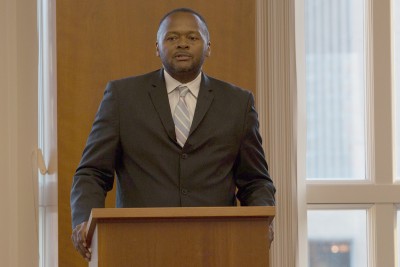
Boston University is holding its first Unity and Community Week to promote dialogue and social justice on campus, teaming up with various student groups and college departments. To begin the week Wednesday evening, Boston National Association for the Advancement of Colored People president Michael Curry visited campus and spoke about his experience as a black activist fighting for social justice.
Hosting events through Friday evening, UCW hopes to emphasize “common ground and leadership” through a variety of lectures, conversations and team-building activities hosted by different student groups throughout campus, according to the BU Student Activities Office’s website.
Approximately 20 students attended the conversation with Curry, hosted by the Howard Thurman Center for Common Ground and BU Hillel at the Florence and Chafetz Hillel House. The conversation highlighted topics like police brutality, diversity and the continuing presence of racial discrimination.
Curry said the only way for society to move forward is to talk about racial issues and increase activism.
“This is a critical time. We need to come together to have the conversation,” Curry said during the event. “We don’t talk about the history. We don’t talk about the solution. Almost every time you turn on the television there’s a new shooting of an unarmed black kid. We have a really big hurdle in front of us.”
Curry added that race is the “elephant in the room,” saying that conversations on important and pressing issues should be open and transparent despite their uneasiness.
“We have to have that conversation so that we can figure out a strategy. That’s the work that I do at NAACP,” he said. “That’s what makes me want to do this work. Engaging in conversation across religion, across race, across genders and around issues that are common and challenging and that we face as a nation. That’s what democracy looks like.”
Ethan Sobel, the director of student life at BU Hillel, said that becoming a community where people can openly share their opinions in a respectful manner is important.
“This is the start of our first ever Unity and Community Week and the goal of this week is to start a conversation on campus about what a community is. Who gets to be a part of it and what does it look like?” Sobel said. “If nothing else, this institutes students, staff, faculty and community members not only to question what a community is but certainly respecting each other.”
HTC assistant director Pedro Falci said he hopes Curry can inspire students and address their concerns on how to become social advocates to make a difference in the community.
“Students want to get involved and they want to make positive changes but they don’t know exactly how to be an activist,” Falci said. “So [Curry] is someone who’s clearly on the ground and addresses these issues and he can provide a picture of how students can actually make a difference in ways they’ve probably never considered before.”
Several attendees said they hope to have meaningful conversations on racial issues and social change. Some said that more BU students should have gone to the talk.
Susannah Keys, a senior in the College of Arts and Sciences, said she appreciated that the discussion expanded on matters outside the BU community.
“One thing that’s really cool about events like these is that you’re bridging gaps between the BU community and what’s happening around us and the city,” she said. “One of the great things about BU is that we have people who can help steer the BU community and engage them with larger issues.”
Amal Hechehouche, also a senior in CAS, said she believes engaging in conversations about activism is an integral part of creating positive change.
“It’s important learning the action [and] steps we can take to actually do something and educate people. It’s important for more people to be involved in this kind of conversation. I hope that the people who came here can explain the message that was talked about by Michael Curry.”
Rahel Tebo, a junior in CAS, said the event was “eye-opening,” touching on topics that are relevant to both campus and urban life.
“A lot of the time BU students don’t really think about the Boston community and live in this BU bubble,” she said. “The way Michael Curry brought his experiences into his work shows there is more BU can do and that there is more that we can do as students.”























































































































